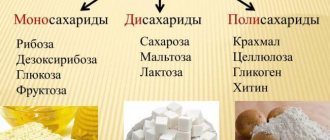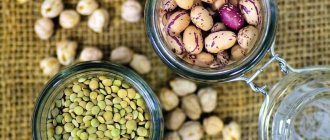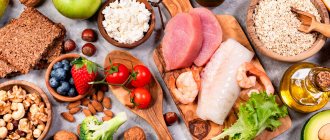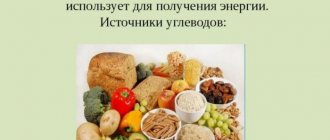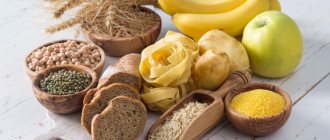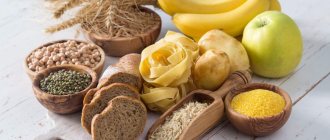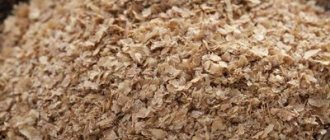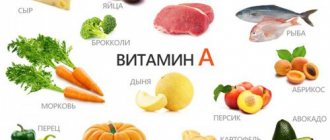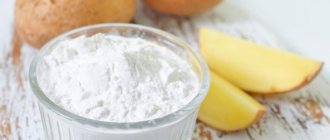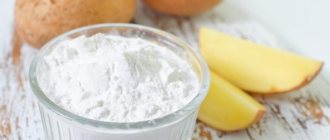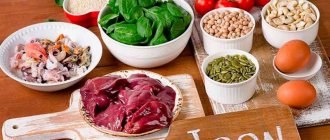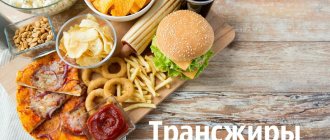Carbohydrates are organic compounds of plant origin, which contain hydrogen, carbon and oxygen. The main function of carbohydrates is to provide the body with energy. They can be compared to fuel for an airplane, without which it will not fly. All carbohydrates are broken down to the simplest element - glucose, which enters all cells and is burned, forming water, carbon dioxide and energy. This energy is needed for processes such as breathing, digestion, thinking, and physical activity. Which foods have more carbohydrates?
What types of carbohydrates are there?
Carbohydrates are divided into:
- Simple - monosaccharides: galactose, glucose and fructose and disaccharides: lactose, sucrose and maltose. They have a sweet taste. They consist of only one molecule, so they dissolve and are absorbed almost instantly when entering the body. Then insulin lowers the rapidly rising blood glucose level, and the brain again demands a new portion of carbohydrates; the feeling of hunger returns. When consumed in large quantities, they promote the formation of fat cells.
- Complex - polysaccharides: glycogen, pectin, starch, fiber. Poorly soluble in water. They take much longer to digest and do not cause a sharp rise in glucose levels, unlike simple carbohydrates, so they provide a long-lasting feeling of satiety. Do not contribute to the formation of fat reserves.
Type of carbohydrates
Which foods have more carbohydrates? These are those products that contain a lot of refined sugar.
Why is sugar dangerous?
If we can say about slow carbohydrates that these are natural fruits and whole grains, then among fast carbohydrates the most useless carbohydrate is sugar. The product has no nutritional value and is considered the drug of the century for a number of reasons.
Sugar:
- Stimulates the formation of beta-endorphins.
- Gives the illusion of stress relief, briefly improving mood.
- It produces biochemical dependence in people.
- It affects the brain in a way similar to opioid intoxication because it stimulates the same receptors that respond to morphine, heroin and codeine.
After eating sweets, people feel calm. They quickly get used to the cake = happiness scheme. As a result, they become dependent.
Excess sugar, as the most prominent representative of bad carbohydrates, leads to:
- hypertension, irritability, hyperactivity
- decreased mental functions, cancer pathology
- suppression of the immune system, accelerated aging
- slowing down recovery processes
Not everyone consciously chooses to abuse simple carbohydrates. Therefore, it is useful to know where sugar is hidden in hidden form.
Back to contents
Daily carbohydrate intake
Normally, proteins, fats and carbohydrates should be in a ratio of 1:1:4. It is recommended to structure your diet so that simple carbohydrates make up 30% and complex carbohydrates – 70%.
The amount of carbohydrates varies depending on gender, age, physical activity and other factors. The greater the level of physical activity of a person and the younger his age, the more carbohydrates are required.
The carbohydrate limit for men ranges from 350 to 580 g, and for women – from 280 to 460 g.
Those who are on a diet are advised to reduce the amount of carbohydrates to 100 g. Those who are actively involved in sports need to consume a large amount of carbohydrates, because their lack will negatively affect the condition of the muscles. The person will become more tired and will not be able to exercise for a long time. It is best to choose complex carbohydrates.
BZhU and their features of conversion into energy
When choosing a packaged product, we can look at the label for the composition, weight and distribution of proteins, fats and carbohydrates (that is, nutritional value). Each of these elements has its own properties and characteristics of transformation into energy when it enters the body. For a person to feel good, it is important to consume a sufficient amount of dietary supplements, vitamins and microelements. Fats are the most energy-intensive nutrient, carbohydrates occupy a middle position, and proteins, in principle, are not always a source of energy. Carbohydrates are broken down much faster than fats, and less oxygen is consumed during this process. Energy is converted from proteins only when other nutrients are insufficient. To lose weight, there are indeed diets that involve eating only proteins and unsaturated fats. But these diets can be used strictly in the absence of medical contraindications and for a short period. In addition, if you completely give up carbohydrates for some time, it will be necessary to fill this “gap” with the proteins and unsaturated fats mentioned above.
Benefits of carbohydrates
As already mentioned, the main purpose of carbohydrates is to replenish energy reserves in the body. It is carbohydrates that supply about 50-60% of energy. But this is not the only useful property.
They are needed for the normal functioning of the cardiovascular, digestive, nervous system, liver, brain (it consumes about 70% of energy), providing the required amount of sugar, and removing harmful substances.
Fiber normalizes cholesterol levels and maintains intestinal tone, improves peristalsis. In addition, they take part in the synthesis of certain molecules, regulate metabolism, and participate in maintaining immunity.
Is it right to give up carbohydrate-containing foods?
Sometimes, people, in pursuit of good shape, decide to avoid eating any carbohydrates. But, this is a bad choice.
- Low-energy nutrition is of the ketogenic type. A lack of energy substances in the diet leads to the process of ketosis - fat burning, during which ketone substances enter the blood. These are toxins, in particular, depressing brain functions.
- In addition, the body increases the production of hormones - norepinephrine, adrenaline and glucagon. These compounds are useful in the short term, but on an ongoing basis lead to exhaustion of the body and endocrine disruption.
- Another unpleasant aspect of a low-carbohydrate diet is hypercholesterolemia with rapid vascular damage and the risk of conditions such as stroke or heart attack.
- Just 3-4 months of eating without plant fiber will cause gastrointestinal problems - vomiting, constipation or nausea. Additionally, a deficiency of vitamins B, C and A will form, the body will become acidic, the nervous system will become hyperactive, and the urinary system will react with gout.
- Separately, disorders of calcium phosphate, hemoglobin and glucose metabolism may develop. That is, a person will become acquainted with type 2 diabetes, osteoporosis or osteopenia.
Therefore, the right choice would be a healthy diet rich in slow carbohydrates.
Back to contents
Products containing harmful carbohydrates
Harmful carbohydrates
These include:
- bread and other flour products;
- drinks with high sugar content;
- sweets, milk chocolate, cakes;
- various jams and preserves;
- alcohol;
- ice cream;
- fast food;
- White rice;
- some cereals, for example semolina;
- instant food products;
- cornflakes;
- sugar;
- some fried foods;
- popcorn.
Low-fat diet: prohibited foods
The most strict version of a low-fat diet involves reducing the amount of fat to 10% of the daily diet.
A low-fat diet involves excluding the following foods:
- fat meat;
- fried foods;
- chocolate;
- fatty dairy products;
- seafood;
- sugar and sweet baked goods;
- fatty sauces;
- condensed milk;
- margarine, spread, back fat;
- sausages, wieners, bacon;
- fast food.
Foods containing healthy carbohydrates
Healthy carbohydrates
This group includes foods with a low glycemic index, which determines the rate of absorption of carbohydrates, and a sufficient content of nutrients:
- fresh vegetables and fruits;
- bran bread;
- meat;
- fish;
- mushrooms;
- Brown rice;
- low-fat dairy products;
- spices;
- nuts.
In addition to carbohydrates, such products contain a sufficient amount of vitamins, organic elements, minerals and other useful and important substances.
Healthy foods with bad ingredients
Diet cereals and candies are simply a trap for buyers, as they contain hefty doses of sugar. It's useful to know that this ingredient is also hidden in unsweetened foods:
- ketchup and salad sauces
- canned meat and fish
- peanut butter
- all types of bread
- yoghurts, muesli, cereal bars
- sausages and sausages
How can I find the information on the label? Read the section “Carbohydrates”, where the explanation “Including sugar” follows. On average, 150 grams of sugar-containing, although unsweetened, products contain up to 2 teaspoons of sugar. Healthy chocolate or cereal contains up to 3-5 spoons per 150 grams.
In conclusion, it is worth noting that nutritionists recommend paying attention not only to the amount of carbohydrates, but also to the presence of fats in foods, since the combination of sugar and fat has a particularly adverse effect on the health of the body.
Back to contents
What can a lack or excess of carbohydrates in the body lead to?
Due to a lack of carbohydrates, metabolism is disrupted. The body begins to replenish energy reserves from proteins, fats or muscle tissue. All this leads to a heavy load on the kidneys and improper salt metabolism.
In addition, due to the breakdown of fats, so-called “acidification” of the body can occur. Chronic deficiency causes glycogen to decrease and fat to accumulate in the liver.
If you severely limit the intake of carbohydrates, then metabolic processes and the functioning of internal organs will be disrupted, a feeling of fatigue, lack of strength, deterioration of cognitive abilities, irritability, and decreased attention will appear.
Apathy, depression, and destruction of important proteins are also possible.
With severe deficiency, the following symptoms appear:
- dizziness;
- headache;
- nausea;
- drowsiness;
- severe weakness;
- hunger.
If you eat food containing sugar, these symptoms disappear.
The role of polysaccharides
Our body needs useful multifunctional compounds - without them it will not be able to function properly:
- They serve as the main source of energy - if you refuse carbohydrate foods, you will feel tired, lethargic, and lack of strength.
- Directly associated with proteins - if the necessary substances do not enter the blood, the body cannot use the protein obtained from food for further work. All he can do is take what has already become building material for muscles. Gluconeogenesis (that’s what this process is called) leads to a decrease in the volume of muscle tissue, and this is fraught with a slowdown in metabolism - a change that is unacceptable when losing weight.
- They normalize the state of the nervous system - it has been proven that a low-carbohydrate diet is dangerous for our brain - it helps to reduce mental acuity.
- Helps avoid hypoglycemia - or a condition when blood sugar levels drop to a critical level. Symptoms: weakness, pallor, dizziness, fainting, hunger.
Carbohydrate diet
To lose weight, you need to eliminate simple carbohydrates
Unlike other diets that are built on severely restricting the amount of carbohydrates, this diet allows their consumption. Indeed, due to a lack of carbohydrates, performance decreases and general condition worsens.
Of course, the carbohydrate diet, like others, has its own rules:
- eat about 5 times a day;
- each serving is approximately 100 g of food and 150 ml of liquid;
- limit the consumption of simple carbohydrates, use mainly complex carbohydrates;
- limit the consumption of sweets, fried foods, sugary drinks, salt;
- The last meal is no later than 7 pm.
Fast carbohydrates: to eat or not
Having learned more about such organic substances, you can more carefully plan your balanced diet. There is no need to completely give up simple carbohydrates. Otherwise, a person may feel tired, weak, irritable and in a bad mood, and this is completely useless. If you want to lose weight, then you should limit your consumption of sweets, flour and sugar. One of the options for control is regular calorie counting or a pre-compiled daily or weekly nutrition plan based on the KBJU that is suitable for you. If you play sports, then after an intense workout you can eat a small bar or cookie during the carbohydrate window, that is, almost immediately after physical activity.
How should you use BU?
A few simple rules for “communicating” with fast carbohydrates will help you take control of your eating behavior without harming your psyche or the body as a whole:
- First of all, there should be a minimum of them at home. In other words, you should not buy kilos of candy and cookies, as, unfortunately, many people like to do. If “sweets” are always nearby, it is much more difficult to resist provocations, and the hand “involuntarily” reaches for more.
- Memorize popular foods that have a high glycemic index and eat them as rarely as possible. As an incentive, there is such a thing as a “cheat meal”, when once within ten or twenty days it is permissible to indulge yourself and eat whatever you really want. However, the basic rule is “Don’t overeat!” must be observed even on days of indulgence.
Fast carbohydrates are our valuable helpers when the body experiences high physical activity (hiking, gym classes, long walks, etc.). In such cases, we “burn” all the calories that come in, and they are not deposited in problem areas.
The optimal time to use BU is the first half of the day, preferably morning. This way, the body gets enough time to fully process the calories it receives, rather than storing them in reserve.
Nutritionists recommend combining the consumption of monosaccharides with meat or vegetables. Protein and fiber, which are found in vegetables and meat, help slow down the absorption of sugars.
Are there any foods that nutritionists still recommend excluding from your diet or consuming them to a minimum? Of course, packaged juices, milk chocolate, cookies, soda and fast foods will not bring benefits to the body. This is worth thinking about if you want to not only lose weight, but also constantly keep yourself in better shape. Minimize white bread, pastries, granulated sugar, honey and some types of fruit (in the form of grapes, watermelon and bananas) in your diet.
So, BUs are not the culprits of excess weight and health problems. If they fit into the daily norm, there will definitely be no harm from them. The main rule: you shouldn’t completely deny yourself sweets, but you need to stop yourself in time when your hand “wants” to take more.
Table of KBJU products
| Milk and dairy products | Squirrels | Fats | Carbohydrates | Kcal |
| Brynza (cow's milk cheese) | 17,9 | 20,1 | 0,0 | 260 |
| Natural yogurt. 2% fat. | 4,3 | 2 | 6,2 | 60 |
| Kefir 3.2% fat | 2,8 | 3,2 | 4,1 | 56 |
| Kefir 1% low-fat | 2,8 | 1 | 4 | 40 |
| Milk 3.2% | 2,9 | 3,2 | 4,7 | 59 |
| Milk 2.5% | 2,8 | 2,5 | 4,7 | 52 |
| Condensed milk without sugar | 6,6 | 7,5 | 9,4 | 131 |
| Condensed milk with sugar | 7,2 | 8,5 | 56 | 320 |
| Whole milk powder | 26 | 25 | 37,5 | 476 |
| Yogurt 2.5% | 2,9 | 2,5 | 4,1 | 53 |
| Ryazhenka 2.5% | 2,9 | 2,5 | 4,2 | 54 |
| Cream 10% (low-fat) | 3 | 10 | 4 | 118 |
| Cream 20% (medium fat content) | 2,8 | 20 | 3,7 | 205 |
| Sour cream 10% (low-fat) | 3 | 10 | 2,9 | 115 |
| Sour cream 20% (medium fat content) | 2,8 | 20 | 3,2 | 206 |
| Dutch cheese | 26 | 26,8 | 0,0 | 352 |
| Processed cheese | 16,8 | 11,2 | 23,8 | 257 |
| Poshekhonsky cheese | 26 | 26,5 | 0,0 | 350 |
| Russian cheese | 24,1 | 29,5 | 0,3 | 363 |
| Swiss cheese | 24,9 | 31,8 | 0,0 | 396 |
| Curd | 7,1 | 23 | 27,5 | 341 |
| Low-fat cottage cheese | 16,5 | 0,0 | 1,3 | 71 |
| Cottage cheese 5% low-fat | 17,2 | 5 | 1,8 | 121 |
| Cottage cheese 9% semi-fat | 16,7 | 9 | 2 | 159 |
| Bread and bakery products | Squirrels | Fats | Carbohydrates | Kcal |
| Baranki | 16 | 1 | 70 | 366 |
| 1st grade wheat flour | 10,6 | 1,3 | 67,6 | 331 |
| Wheat flour 2nd grade | 11,7 | 1,8 | 63,7 | 324 |
| Wheat flour variety | 10,3 | 1,1 | 68,9 | 334 |
| Seeded rye flour | 6,9 | 1,4 | 67,3 | 304 |
| Rusks for tea | 10 | 2,3 | 73,8 | 397 |
| Drying poppy seeds | 11,3 | 4,4 | 70,5 | 372 |
| Wheat bread | 8,1 | 1 | 48,8 | 242 |
| Rye bread | 13 | 3 | 40 | 250 |
| Sliced loaf | 7,5 | 2,9 | 50,9 | 264 |
| Loaf of Moscow Region | 7,5 | 2,6 | 50,6 | 261 |
| Fats, butter and margarine | Squirrels | Fats | Carbohydrates | Kcal |
| Confectionery fat | 0,0 | 99,8 | 0,0 | 897 |
| Mayonnaise Provencal | 3,1 | 67 | 2,6 | 624 |
| Table margarine 40% | 0,0 | 40 | 0,0 | 360 |
| Milk margarine | 0,3 | 82 | 1 | 743 |
| Vegetable oil | 0,0 | 99 | 0,0 | 899 |
| Butter 72.5% | 1 | 72,5 | 1,4 | 662 |
| Butter 82% | 0,7 | 82 | 0,7 | 740 |
| Palm oil | 0,0 | 99,9 | 0,0 | 899 |
| Cereals | Squirrels | Fats | Carbohydrates | Kcal |
| Hercules | 12,5 | 6,2 | 61 | 352 |
| Buckwheat (done) | 9,5 | 2,3 | 65,9 | 306 |
| Buckwheat kernels (buckwheat) | 12,6 | 3,3 | 62,1 | 313 |
| Corn grits | 8,3 | 1,2 | 75 | 337 |
| Semolina | 10,3 | 1 | 67,4 | 328 |
| Oat groats | 12,3 | 6,1 | 59,5 | 342 |
| Pearl barley | 9,3 | 1,1 | 73,7 | 320 |
| Wheat groats | 11,5 | 1,3 | 62 | 316 |
| Millet cereal | 11,5 | 3,3 | 69,3 | 348 |
| White rice | 6,7 | 0,7 | 78,9 | 344 |
| Oatmeal | 12,5 | 6 | 64,9 | 363 |
| Barley | 10,4 | 1,3 | 66,3 | 324 |
| Vegetables | Squirrels | Fats | Carbohydrates | Kcal |
| Eggplant | 1,2 | 0,1 | 4,5 | 24 |
| Swede | 1,2 | 0,1 | 7,7 | 37 |
| Green peas | 5 | 0,2 | 13,8 | 73 |
| Green bean | 4 | 0,0 | 4,3 | 32 |
| Zucchini | 0,6 | 0,3 | 4,6 | 24 |
| White cabbage | 1,8 | 0,1 | 4,7 | 27 |
| Red cabbage | 1,8 | 0,0 | 7,6 | 24 |
| Cauliflower | 2,5 | 0,3 | 5,4 | 30 |
| Potato | 2 | 0,4 | 16,1 | 76 |
| Green onion (feather) | 1,3 | 0,0 | 4,6 | 19 |
| Leek | 2 | 0,0 | 8,2 | 33 |
| Bulb onions | 1,4 | 0,0 | 10,4 | 47 |
| Carrot | 1,3 | 0,1 | 6,9 | 32 |
| Ground cucumbers | 0,8 | 0,1 | 2,8 | 15 |
| Greenhouse cucumbers | 0,7 | 0,0 | 1,8 | 10 |
| Sweet yellow pepper | 1,3 | 0,0 | 5,3 | 27 |
| Sweet green pepper | 1,3 | 0,0 | 6,9 | 33 |
| Sweet red pepper | 1,3 | 0,0 | 5,3 | 27 |
| Parsley (greens) | 3,7 | 0,0 | 8,1 | 45 |
| Parsley (root) | 1,5 | 0,0 | 11 | 47 |
| Rhubarb (petiole) | 0,7 | 0,0 | 2,9 | 16 |
| Radish | 1,2 | 0,1 | 3,4 | 19 |
| Radish | 1,9 | 0,0 | 7 | 34 |
| Salad | 1,5 | 0,0 | 2,2 | 14 |
| Beet | 1,5 | 0,1 | 8,8 | 43 |
| Tomatoes | 1,1 | 0,2 | 3,7 | 20 |
| Cheremsha | 2,4 | 0,1 | 6,5 | 34 |
| Garlic | 6,5 | 0,5 | 29,9 | 143 |
| Spinach | 2,9 | 0,3 | 2 | 22 |
| Sorrel | 1,5 | 0,0 | 2,9 | 19 |
| Fruits | Squirrels | Fats | Carbohydrates | Kcal |
| Apricots | 0,9 | 0,0 | 9 | 44 |
| Quince | 0,6 | 0,0 | 9,8 | 40 |
| Cherry plum | 0,2 | 0,0 | 6,9 | 27 |
| A pineapple | 0,4 | 0,0 | 10,6 | 49 |
| Bananas | 1,5 | 0,0 | 21,8 | 95 |
| Cherry | 0,8 | 0,0 | 11,3 | 49 |
| Pomegranate | 0,9 | 0,0 | 11,8 | 52 |
| Pear | 0,4 | 0,0 | 10,7 | 42 |
| Figs | 0,7 | 0,0 | 13,9 | 56 |
| Peaches | 0,9 | 0,0 | 10,4 | 44 |
| Garden plum | 0,8 | 0,0 | 9,9 | 43 |
| Dates | 2,5 | 0,0 | 72,1 | 281 |
| Persimmon | 0,5 | 0,0 | 15,9 | 62 |
| Cherries | 1,1 | 0,0 | 12,3 | 52 |
| Apples | 0,4 | 0,0 | 11,3 | 46 |
| Orange | 0,9 | 0,0 | 8,4 | 38 |
| Grapefruit | 0,9 | 0,0 | 7,3 | 35 |
| Lemon | 0,9 | 0,0 | 3,6 | 31 |
| Mandarin | 0,8 | 0,0 | 8,6 | 38 |
| Grape | 0,4 | 0,0 | 17,5 | 69 |
| Blackberry | 2 | 0,0 | 5,3 | 33 |
| Strawberries | 1,8 | 0,0 | 8,1 | 41 |
| Cranberry | 0,5 | 0,0 | 4,8 | 28 |
| Gooseberry | 0,7 | 0,0 | 9,9 | 44 |
| Raspberries | 0,8 | 0,0 | 9 | 41 |
| White currant | 0,3 | 0,0 | 8,7 | 39 |
| Black currant | 1,0 | 0,0 | 8,0 | 40 |
| Blueberry | 1,1 | 0,0 | 8,6 | 40 |
| Fresh rosehip | 1,6 | 0,0 | 24 | 101 |
| Dried rose hips | 4,0 | 0,0 | 60 | 253 |
| Dried fruits | Squirrels | Fats | Carbohydrates | Kcal |
| Dried apricots | 5 | 0,0 | 67,5 | 278 |
| Dried apricots | 5,2 | 0,0 | 65,9 | 272 |
| Raisins with pit | 1,8 | 0,0 | 70,9 | 276 |
| Raisins sultanas | 2,3 | 0,0 | 71,2 | 279 |
| Cherry | 1,5 | 0,0 | 73 | 292 |
| Pear | 2,3 | 0,0 | 62,1 | 246 |
| Peaches | 3,0 | 0,0 | 68,5 | 275 |
| Prunes | 2,3 | 0,0 | 65,6 | 264 |
| Apples | 3,2 | 0,0 | 68 | 273 |
| Legumes | Squirrels | Fats | Carbohydrates | Kcal |
| Beans | 6 | 0,1 | 8,3 | 58 |
| Peas | 23 | 1,6 | 57,7 | 323 |
| Whole peas | 23 | 1,2 | 53,3 | 303 |
| Soybeans | 34,9 | 17,3 | 26,5 | 395 |
| Beans | 22,3 | 1,7 | 54,5 | 309 |
| Lentils | 24,8 | 1,1 | 53,7 | 310 |
| Mushrooms | Squirrels | Fats | Carbohydrates | Kcal |
| White fresh | 3,2 | 0,7 | 1,6 | 25 |
| White dried | 27,6 | 6,8 | 10 | 209 |
| Fresh boletus | 2,3 | 0,9 | 3,7 | 31 |
| Fresh boletuses | 3,3 | 0,5 | 3,4 | 31 |
| Meat, poultry and offal | Squirrels | Fats | Carbohydrates | Kcal |
| Mutton | 16,3 | 15,3 | 0,0 | 203 |
| Beef | 18,9 | 12,4 | 0,0 | 187 |
| horsemeat | 20,2 | 7 | 0,0 | 143 |
| Rabbit | 20,7 | 12,9 | 0,0 | 199 |
| Pork lean | 16,4 | 27,8 | 0,0 | 316 |
| Pork is fatty | 11,4 | 49,3 | 0,0 | 489 |
| Veal | 19,7 | 1,2 | 0,0 | 90 |
| Beef liver | 17,4 | 3,1 | 0,0 | 98 |
| Beef Kidneys | 12,5 | 1,8 | 0,0 | 66 |
| Beef Udder | 12,3 | 13,7 | 0,0 | 173 |
| Beef Heart | 15 | 3 | 0,0 | 87 |
| Beef Tongue | 13,6 | 12,1 | 0,0 | 163 |
| Pork kidneys | 13 | 3,1 | 0,0 | 80 |
| Pork liver | 18,8 | 3,6 | 0,0 | 108 |
| Pork heart | 15,1 | 3,2 | 0,0 | 89 |
| Pork tongue | 14,2 | 16,8 | 0,0 | 208 |
| Geese | 16,1 | 33,3 | 0,0 | 364 |
| Turkey | 21,6 | 12 | 0,8 | 197 |
| Chickens | 20,8 | 8,8 | 0,6 | 165 |
| Chickens | 18,7 | 7,8 | 0,4 | 156 |
| Ducks | 16,5 | 61,2 | 0,0 | 346 |
| Sausage | Squirrels | Fats | Carbohydrates | Kcal |
| Boiled sausage Diabetic | 12,1 | 22,8 | 0,0 | 254 |
| Boiled sausage Dietary | 12,1 | 13,5 | 0,0 | 170 |
| Boiled sausage Doctorskaya | 13,7 | 22,8 | 0,0 | 260 |
| Boiled sausage Lyubitelskaya | 12,2 | 28 | 0,0 | 301 |
| Boiled sausage Milk | 11,7 | 22,8 | 0,0 | 252 |
| Boiled sausage Separate | 10,1 | 20,1 | 1,8 | 228 |
| Boiled veal sausage | 12,5 | 29,6 | 0,0 | 316 |
| Pork sausages | 10,1 | 31,6 | 1,9 | 332 |
| Dairy sausages | 12,3 | 25,3 | 0,0 | 277 |
| Russian sausages | 12 | 19,1 | 0,0 | 220 |
| Pork sausages | 11,8 | 30,8 | 0,0 | 324 |
| Boiled-smoked Amateur | 17,3 | 39 | 0,0 | 420 |
| Boiled-smoked Cervelat | 28,2 | 27,5 | 0,0 | 360 |
| Semi-smoked Krakow | 16,2 | 44,6 | 0,0 | 466 |
| Semi-smoked Minsk | 23 | 17,4 | 2,7 | 259 |
| Semi-smoked Poltavskaya | 16,4 | 39 | 0,0 | 417 |
| Semi-smoked Ukrainian | 16,5 | 34,4 | 0,0 | 376 |
| Raw smoked Amateur | 20,9 | 47,8 | 0,0 | 514 |
| Raw smoked Moscow | 24,8 | 41,5 | 0,0 | 473 |
| Canned meat and smoked meats | Squirrels | Fats | Carbohydrates | Kcal |
| Beef stew | 16,8 | 18,3 | 0,0 | 232 |
| Pork stew | 14,9 | 32,2 | 0,0 | 349 |
| Raw smoked brisket | 7,6 | 66,8 | 0,0 | 632 |
| Raw smoked loin | 10,5 | 47,2 | 0,0 | 467 |
| Ham | 22,6 | 20,9 | 0,0 | 279 |
| Eggs | Squirrels | Fats | Carbohydrates | Kcal |
| Chicken egg | 12,7 | 10,9 | 0,7 | 157 |
| Egg powder | 45 | 37,3 | 7,1 | 542 |
| Protein powder | 73,3 | 1,8 | 7 | 336 |
| Dry yolk | 34,2 | 52,2 | 4,4 | 623 |
| Quail egg | 11,9 | 13,1 | 0,6 | 168 |
| Fresh fish and seafood | Squirrels | Fats | Carbohydrates | Kcal |
| Pink salmon | 20,5 | 6,5 | 0,0 | 142 |
| Flounder | 16,5 | 1,8 | 0,0 | 83 |
| crucian carp | 17,7 | 1,8 | 0,0 | 112 |
| Carp | 16 | 5.6 | 0,0 | 96 |
| Chum salmon | 22 | 5.6 | 0,0 | 138 |
| Smelt | 15.4 | 4.5 | 0,0 | 102 |
| Bream | 17.1 | 4.1 | 0,0 | 105 |
| Salmon | 20.8 | 15.1 | 0,0 | 219 |
| Macrurus | 13.2 | 0.8 | 0,0 | 60 |
| Pollock | 15.9 | 0.7 | 0,0 | 70 |
| capelin | 13.4 | 11.5 | 0,0 | 157 |
| Navaga | 16.1 | 1 | 0,0 | 73 |
| Burbot | 18.8 | 0.6 | 0,0 | 81 |
| Sea bass | 17.6 | 5.2 | 0,0 | 117 |
| River perch | 18.5 | 0.9 | 0,0 | 82 |
| Sturgeon | 16.4 | 10.9 | 0,0 | 164 |
| Halibut | 18.9 | 3 | 0,0 | 103 |
| Blue whiting | 16.1 | 0.9 | 0,0 | 72 |
| Carp | 18.4 | 5.3 | 0,0 | 121 |
| Large saury | 18.6 | 20.8 | 0,0 | 262 |
| Small saury | 20.4 | 0.8 | 0,0 | 143 |
| Salaka | 17.3 | 5.6 | 0,0 | 121 |
| Herring | 17.7 | 19.5 | 0,0 | 242 |
| Whitefish | 19 | 7.5 | 0,0 | 144 |
| Mackerel | 18 | 9 | 0,0 | 153 |
| Som | 16.8 | 8.5 | 0,0 | 144 |
| Horse mackerel | 18.5 | 5 | 0,0 | 119 |
| Sterlet | 17 | 6.1 | 0,0 | 320 |
| Zander | 19 | 0.8 | 0,0 | 83 |
| Cod | 17.5 | 0.6 | 0,0 | 75 |
| Tuna | 22,7 | 0,7 | 0,0 | 96 |
| coal fish | 13.2 | 11.6 | 0,0 | 158 |
| Sea eel | 19.1 | 1.9 | 0,0 | 94 |
| Acne | 14.5 | 30.5 | 0,0 | 333 |
| Hake | 16.6 | 2.2 | 0,0 | 86 |
| Pike | 18.4 | 0.8 | 0,0 | 82 |
| Ide | 18.2 | 1,0 | 0,0 | 81 |
| Cod liver | 4,2 | 65,7 | 0,0 | 613 |
| Squid | 18 | 0,3 | 0,0 | 75 |
| Crab | 16 | 0,5 | 0,0 | 69 |
| Shrimp | 18 | 0,8 | 0,0 | 83 |
| Sea kale | 0,8 | 0,2 | 3 | 5 |
| Nuts | Squirrels | Fats | Carbohydrates | Kcal |
| Hazelnut | 16,1 | 66,9 | 9,9 | 704 |
| Almond | 18,6 | 57,7 | 13,6 | 645 |
| Walnut | 15,2 | 61,3 | 10,2 | 648 |
| Peanut | 26,3 | 45,2 | 9,7 | 548 |
| sunflower seed | 20,7 | 52,9 | 5 | 578 |
| Sweets | Squirrels | Fats | Carbohydrates | Kcal |
| Honey | 0,8 | 0,0 | 80,3 | 308 |
| Marshmallow | 0,8 | 0,0 | 78,3 | 299 |
| Marmalade | 4,3 | 0,1 | 77,7 | 296 |
| Caramel | 0,0 | 0,1 | 77,7 | 296 |
| Chocolate candies | 4,3 | 39,5 | 54,2 | 596 |
| Paste | 0,5 | 0,0 | 80,4 | 305 |
| Granulated sugar | 0,0 | 0,0 | 99,5 | 374 |
| Sunflower halva | 11,6 | 29,7 | 54 | 516 |
| Dark chocolate | 6,9 | 35,3 | 52,6 | 540 |
| Milk chocolate | 6,9 | 35,7 | 52,4 | 547 |
| Waffles with French fillings | 3,2 | 2,8 | 80,9 | 350 |
| Waffles with fat fillings | 3,4 | 30,2 | 64,7 | 539 |
| Tube cake with cream | 1,7 | 25,2 | 50,9 | 454 |
| Airy cake | 3,1 | 16,3 | 68,5 | 419 |
| Gingerbread | 5,8 | 6,5 | 71,6 | 364 |
| Assorted cake | 4,7 | 15 | 36 | 294 |
| Cake Prague | 4,6 | 26,5 | 65,1 | 517 |
What to eat to lose weight - more about proper carbohydrate consumption
See who needs how much and what kind of carbohydrates. In fact, you only need very few of them.
| Target | Norm of carbohydrates per day | Composition of carbohydrates | Recommendations |
| Lose weight | 20-40 g | slow | Consume carbohydrates in the first half of the day, after lunch - only proteins and fats |
| Maintain normal body weight | 50-60 g | slow - 80%, fast - 20% | Consume carbohydrates no later than 16.00 |
| To gain weight | 100-200 g | 50 to 50 | You can leave complex carbohydrates for the evening |
| For those who exercise intensively | 55% to 70% of daily calorie needs | 50 to 50 | It is better to consume slow carbohydrates about an hour before training, and fast carbohydrates 30 minutes after training. |
